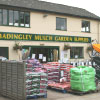Five Key Gardening Jobs for December
The shortening days, coupled with poor weather, mean that you won’t be able to spend that much time in your garden in December. However, there are still a number of jobs that you should be thinking about before Christmas. Here, Madingley Mulch outline five of the most important ones.
This article is a three- to four-minute read.
Madingley Mulch – Garden Mulch Suppliers in Cambridge
At Madingley Mulch, we supply a range of outdoor gardening products, including soil conditioners and composts, as well as mulch. Visit our online shop to see the full range. You can also call us on 01954 212144 if you need any advice.
- Move Items into the Greenhouse
Frost is one of a gardener’s worst enemies. Any potentially vulnerable plants should be moved into the greenhouse or any indoor location where there is some protection from the elements.
This especially applies to any potted plants; if they are in terracotta pots, then the pots themselves can crack in freezing weather. The alternative is to leave them outside but cover them in bubble wrap or something similar.
- Discourage Any Pests
There may be one or two hardy pests which can still do some damage in December. There are a number of ways you can minimise the risk of any December damage without using any pesticides.
One way is to make sure that you have finished raking up any fallen leaves, particularly those in flower beds. Left untouched, these could harbour slugs and other pests, which could damage your plants.
Another approach is to encourage birds into your garden by hanging one or more feeders. Fat balls, sunflower seeds and peanuts will all provide valuable nutrients to ensure your feathered friends stay warm and healthy. While they are in your garden, the birds may also get rid of any overwintering pests (particularly if you put the feeders near any rose bushes).
- Lay Down Some Mulch
It’s not too late to put down some mulch to provide your plants with some winter warmth. However, you shouldn’t do it too early – leave it until after the first few hard frosts, once the ground is cold or has lightly frozen (but the soil is moist). Applying the mulch too early can trap warmth in the soil and encourage plants to put out new growth, which can then be damaged by later hard freezes.
As well as deterring weeds and retaining moisture in the soil, the mulch will also improve the soil’s structure in time for the new growing season next year.
Our mulches can be found here, and our soils, conditioners and composts here. These include two products exclusive to Madingley Mulch – Denise’s Delight and Tony’s Tonic.
- Prune Shrubs and Trees
There may still be a few trees and shrubs which will benefit from a December prune. These include free-standing fruit trees (particularly apples and pears) and trailing plants such as roses and wisteria.
Berried winter shrubs (which include hawthorn and honeysuckle, as well as holly and ivy) should also be cut back. Not only will this improve their overall health, but they should give you plenty of seasonal Christmas decorations for your home.
- Get an Early Start on Growing for Next Year
Even though it’s December, you can still plant a few species this month. Broad beans and onions should survive the winter, although you should sow these indoors first and move them outside once the weather (and temperatures) improve. The same applies to flowers such as sweet peas and geraniums – grow them indoors first, then transplant them outdoors later.
Madingley Mulch – a One-Stop Shop for Your Outdoor Gardening Supplies
We are one of the leading garden mulch suppliers in the Cambridge area. However, Madingley Mulch can be a one-stop shop for all your gardening needs, not just soils, conditioners and composts. Whether you need sand pit sand in Suffolk, decorative stones in Hertfordshire or allotment supplies in Essex, we can help.
FAQS:
Q: Why is frost so damaging to plants?
If the temperature drops below freezing, any water inside plant cells freezes and expands, causing cell walls to rupture and tissues to die. This leads to physical damage like blackened leaves and mushy stems, and it can also prevent the plant from absorbing water and nutrients. Rapid thawing, especially in morning sun, and dry winds can worsen the damage. Laying down a protective layer of mulch should avoid most of these problems.
Q: How much mulch should I lay down?
A: You shouldn’t lay down too much, as it can form a barrier, preventing water from penetrating it, and it could also stop air from getting through, which worsens the condition of your plants and can cause root rot.
Our general advice is not to put down more than an inch of mulch on newly planted bushes or trees, and around three inches of mulch around flower beds and more established trees and shrubs. Take care to ensure the mulch doesn’t come directly into contact with the plant’s roots. For more information, read our previous blog post here.
We also have a mulch calculator on our website, which will help you work out how much you need to order.
Q: Does Madingley Mulch offer a delivery service?
Yes, we can deliver your products to your door. We operate a sliding scale of prices, depending on how far away you live from our base. The minimum order to qualify for delivery is £50. For more information, check out our deliveries page.
Back to blog




